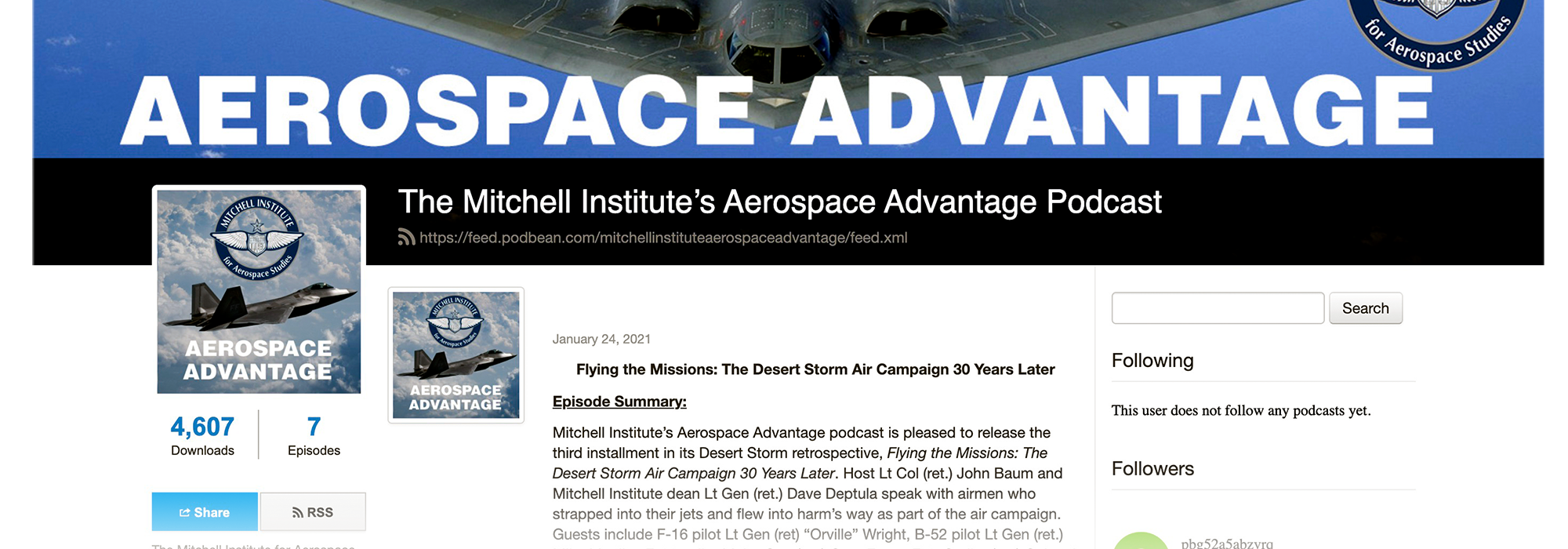During his time in the Air Force, John “Slick” Baum was a pilot with the 555th Fighter Squadron, an instructor at the F-16 weapons school, a Thunderbird, and an Air Force fellow, among other assignments. But if he had a dollar for every time someone asked him what it’s like to land on an aircraft carrier, or walked up to him while he was wearing his Thunderbird flight suit, he would also be a lot wealthier, he said.
“I think from a communication standpoint, [the Air Force] has a lot of work to do,” Baum said, noting that most Americans don’t understand what the Air Force does for them every day, so explaining the need for a Space Force is a “really hard conversation to have.”
To help with that conversation—and to make some of the Mitchel Institute for Aerospace Studies’ work accessible to a wider audience—Mitchell in November launched the “Aerospace Advantage” podcast, hosted by Baum. The first few episodes were designed as an introduction to aerospace power, the threat environment, and the state of today’s Air Force, with subsequent episodes building on that, explained Mitchell’s Executive Director, Douglas Birkey.
The idea, Baum said, is that if someone is “interested in aerospace or what the Space Force is doing, but you work in banking on Wall Street or something like that,” and don’t have a lot of background knowledge on the topics typically covered in Mitchell Institute reports, for instance, they will still be able to “hop right in” and listen to the podcast. After the first three episodes, “they could listen to anything and understand what’s going on.”
It can also introduce younger Airmen and Guardians to topics they may not otherwise begin studying until later in their careers, Baum said.
“It’s helping introduce a captain to starting to think about, you know, the policy churn and the important budget decisions that affect him at the tactical level at the squadron,” he said. Noting that he was getting ready to interview Chief of Space Operations Gen. John W. “Jay” Raymond, Baum added: “If you’re a brand-new Guardian and you want to understand what the top leaders are thinking, I mean, we’re bringing it right to you, to where these folks are on the treadmill or driving to work.”
In selecting a host, Birkey said he “knew that we needed somebody with operational credibility and with a direct ability to own, and credibly say, ‘I’ve been there.’” Having known Baum for several years, Birkey said, he “thought he’d be a really, really good fit.”
A recent episode focused on Desert Storm, and included interviews with retired Lt. Gen. Mike A. Loh, retired Lt. Gen. David A. Deptula, and retired Col. John A. Warden III, covering the foundation of the air campaign, key events, and lessons learned.
“That’s what we’re doing with this podcast, we’re peeling back the layers of the onion and getting to the people, and to the roots of what this history was, if it’s a historical perspective,” Baum explained. This is critical to making sure good ideas continue to be “pushed forward … because, you know, we have really courageous Airmen and Guardians out there that have wonderful ideas, and they shouldn’t be afraid to push them forward.
The story of Desert Storm is “proof that it is the person with the really good idea, presenting it properly, is what’s going to change history.”
Mitchell will continue publishing reports, hosting live events, and producing its Aerospace Nation video series even after the pandemic is over—in addition to the podcast, Birkey said. But while the video series is “optimized for people that are really kind of ‘in the Beltway’ or in the industry,” the podcast will “afford you more of a conversational insight, with a lot of the stakeholders that might have been part of our report.”
New episodes are posted every other week and occasionally will be supplemented with special episodes.
